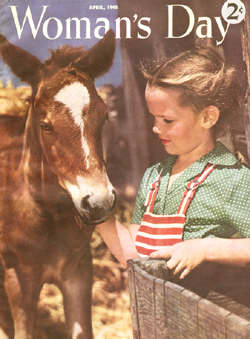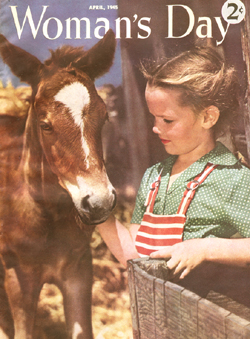I recently examined the contents of an April 1945 “Woman’s Day” magazine that carried a price tag of two cents. I was three years old when this publication hit the local magazine stands. What impressed me the most was the emphasis of World War II on advertisements and sacrifices made during the conflict. For example:

Red Goose Shoes: “Help Uncle Sam save leather. Buy boys’ and girls’ shoes that wear longer. Invest in war bonds regularly.” Texcel Tape: “Today most Texcel Tape that’s made is being used for war. Buy bonds and stamps until victory returns to your store. Oakite Cleanser: “Buy war bonds and stamps.”
Johnson’s Glo-Coat Floor Polisher: “Fibber McGee and Molly say, ‘Nurses are needed. All women can help. See the Red Cross or write the Surgeon General, U.S. Army, Washington, D.C.’” SweetHeart Toilet Soap: “Don’t waste soap. It contains materials vital to the war effort.” McCormick & Co.: “Serving the Armed Forces throughout the world.”
Swift’s Allsweet Vegetable Oleomargine: “Your first duty to your country – Buy war bonds.” Waldorf Tissue: “The more war bonds you buy, the shorter the war.” Beech-Nut Gum: “Until final victory, you may not always find this delicious gum at your (store). Our fighting men are now getting most of it.”
Fletcher’s Castoria (The Laxative made especially for children): The ad title was “I became an Army Nurse and solved a Navy Problem.” The problem was that her brother, a sailor, and his wife had a baby boy suffering from irregularity. The quandary was quickly eradicated with a bottle of Fletcher’s Castoria.
Speed Queen’s washing machine ad revealed the scarcity of appliances during the war. It showed a housewife running toward her husband and joyfully proclaiming, “I’ve got a priority. I stopped at Jones Appliance today and made arrangements to get one of the first Speed Queen washers they get in (after the war). All I had to do was register in a little book. We will be notified when the first shipment arrives.”
Balanced Pacific Sheets gave a lengthy plea: “Let’s pitch in and give the boys what they need to finish this war and give it in lavish abundance. Take a war job or hang on the one you have. Buy bonds … more and more and still more. Conserve your worldly goods: mend that old sheet; don’t throw it away. And when at last you must buy replacements, let them be (of course) superb Pacific Balanced Sheets.”
An article titled “My Country “Twas of Thee” warns returning servicemen that things would not be as they left them and they too must sacrifice until supplies catch up with demand.
Another article, “The High School Crowd Lends a Hand,” describes how volunteers were serving in the Junior Division of The American Women’s Hospitals Reserve Corps at Jamaica Hospital in Long Island, NY. The ladies worked one half day each week performing a variety of helpful tasks.
A notice on one page said: “The wartime burden on transportation facilities may cause delays in shipment of Woman’s Day Magazine to some stores. We regret any inconvenience you may be caused and ask that you not to blame your store manager.”
Another advertisement titled “Carry Victory in Your Basket” suggested numerous helpful hints for reducing paper needs: “Every time you go to the store and carry your purchases home unwrapped, you help bring victory so much nearer. Take along a basket, box, shopping bag or some permanent container that is roomy enough to carry your purchase home.”
The ad asserted how paper was used to wrap and protect more than 700,000 different war items including shell containers, bomb rings, parachutes, flares, blood plasma, vests and V-Mail envelopes. It ended with the words: “Remember – Paper is War Power.”

Comments are closed.